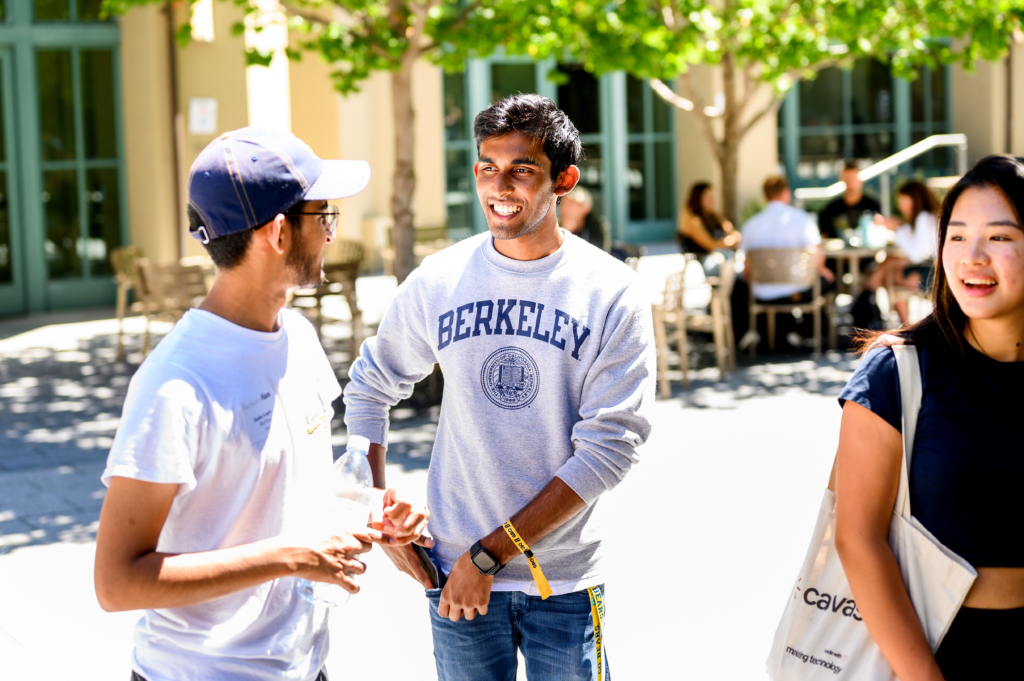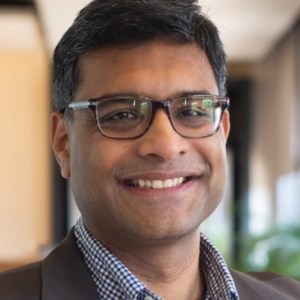
Undergraduates returned the Berkeley Haas School of Business on August 24. The school has announced some changes to the program, including the elimination of its maximum mean GPA policy. Photo by Noah Berger
When Haas School of Business undergraduates returned to campus late last month, the school had already announced a monumental change to the program: In 2024, the undergrad would expand to a 4-year program thanks to a $30 million gift from Haas alumnus Warren “Ned” Spieker, ‘66.
The school has since announced three other significant changes to its undergrad program, one that received a standing ovation when it was announced at student orientation: Hass is eliminating its maximum mean GPA grading policy, is starting a new minor in sustainability, and creating a new entrepreneurship hub that will open in 2023.
NO MORE MAXIMUM MEAN GPA
In 2011, Haas announced a maximum mean GPA grading policy to create consistent grading practices across courses, to motivate students to take their coursework seriously, and to hold faculty accountable to Haas’ rigorous standards. The policy was shortly after expanded across Haas, including the part-time MBA and undergraduate programs.

Emma Hayes Daftary
Students nicknamed it the Haas Curve, even though it’s not true a Bell curve in which a small number of students earn A’s (and F’s), a few more earn B’ and D’s, and most students earn C’s.. Instead, the policy restricted a course’s mean GPA to a stated maximum, but didn’t restrict how many A’s a professor could award. The policy set mean maximums at 3.45 for core classes and 3.5 for electives of 18 or more students in the undergraduate program.
That’s not how students perceived it, however. “It’s maybe the most misunderstood policy that we have,” says Emma Hayes Daftary, assistant dean of undergraduate programs.
The undergraduate program committee had debated for the better part of two years whether the policy was effective at the undergrad level, and conducted a grading analysis looking at data from 2009 (three years before the program was rolled out) to 2021.
“What it showed is that while the policy had impacted the grading patterns at an aggregate level at the full time MBA program and brought them into a more consistent band, it had not deeply impacted the grades at the undergraduate level. In fact, grading patterns at the undergraduate level had remained pretty consistent,” Daftary tells Poets&Quants.
“But what it has done since 2011, is it really created this perception of grade scarcity at the undergraduate level about how many top grades are actually available. And, it’s increased a culture of competition which is frankly not helpful.”
A FOCUS ON COLLABORATION
Since stepping into the assistant deanship role in April, the grading policy has been at the top of the agenda for student leaders. Students hated it because so many next steps at the undergraduate level are contingent on high grades: recruiters often look at GPAs as do internship employers, which can eventually lead to full-time offers, for example.
Some faculty also hated it because after semester grades were posted, students were hyper focused on the final grades and there was the perception that professors were only allowed to award a limited, finite number of A’s.

Students at Haas’ undergraduate orientation. Photo by Noah Berger
In May, faculty voted to end the policy at the undergraduate level. It remains the policy of the full-time graduate program.
“I announced the change (to the undergraduate program) at orientation, and I got a standing ovation,” Daftary says. “One thing we are really working to do in the undergraduate community at Haas is focus on inclusion and belonging. If students feel like they are in competition with each other, and they see a scarcity of grades or opportunity, it’s difficult to foster collaboration.”
SUMMER MINOR ON SUSTAINABILITY
A second change to the Haas undergraduate program this year is the creation of a new Summer Minor in Sustainability, a partnership with UC Berkeley’s Rausser College of Natural Resources. It began this summer with enrollment in the high teens, but Daftary expects that number to rise as students become aware of the program.
“There’s quite a buzz around sustainable business practices. Many companies are looking for students with these skills and the need for sustainability practices to combat climate change,” she says.
Courses for the 15-credit minor (five classes) will be taught over the summer, and students can opt to take them all at once or over the course of two years. Courses include topics such as Innovation and Entrepreneurship, Investing, Business Models and others, all focused around sustainability.
“We recognized that the College of Natural Resources is just a phenomenal force in this space around sustainability,” Daftary says. “Several of our employer partners have expressed that they want to bring students from all levels who have an understanding and passion for best practices around sustainability.”
HAAS ENTREPRENEURSHIP HUB
UC Berkeley already has a strong entrepreneurial ecosystem, says Saikat Chaudhuri, faculty director of the Management, Entrepreneurship & Technology program, a flagship dual-degree program in business and engineering. He is also the director of the Haas Entrepreneurship Hub which will open next year.

Saikat Chaudhuri
The university has many innovation, entrepreneurship, and startup programs scattered across its departments and at different student levels. These include the Berkeley Haas Entrepreneurship program, the Sutardja Center in the engineering department, the Startup@BerkeleyLaw and others. It also has accelerators, fellowship programs, industry partnerships and other programs to foster entrepreneurship among its students, faculty, and alumni.
The Haas Entrepreneurship Hub is designed to be a one-stop shop for students across the university and at any point in their entrepreneurial journey to access and learn about Berkeley’s wide innovation ecosystem.
“The point is we can’t build something on our own that is going to be of a scale and scope which covers everything. Think of it as a uniting mechanism, in some sense, complementing the rest of the ecosystem,” Chaudhuri tells Poets&Quants.
The Hub will be located in a renovated building designed by Julia Morgan, a prominent California architect, steps away from the Haas Campus. It will welcome the “entrepre-curious” to students working to launch start-ups, to everyone in between. It will connect students to resources on campus and off, provide space for students to gather and work on their projects, and provide a deep mentorship network.
“Here at Berkeley, we want to create leaders who combine technology and business to solve the world’s most pressing problems. That’s our initial motivation, everything else is a byproduct, and the entrepreneurship hub is no different,” Chaudhuri says. “We hope that people will use the opportunity to find each other to go and solve big problems because we think we need it. Berkeley has the ethos, the DNA, the mission orientation, as a public university to do these things. And I think we’re all hoping that will be part of the equation.”
DON’T MIS: UC-BERKELEY HAAS TO BECOME 4-YEAR B-SCHOOL and UC-BERKELEY HAAS DEAN: WHY WE ARE EXPANDING FROM 2 TO 4 YEARS










